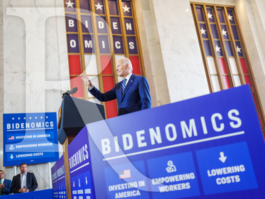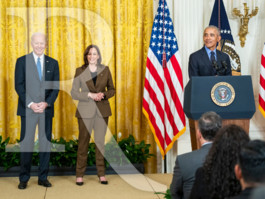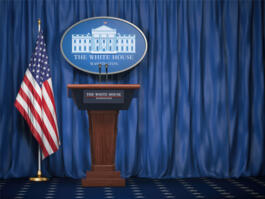Obama Bows, but the World Refuses to Bow Back
A Commentary By Micael Barone
On his 10-day trip to Asia and in his 10th month in office, Barack Obama is beginning to encounter limits on his ambition to change the world. Even as he bowed to the king of Saudi Arabia last April and to the emperor of Japan last week, the world refuses to bow back.
This is not how it was supposed to be. "I am absolutely certain that generations from now," he said on the night he clinched the Democratic presidential nomination in June 2008, "we will be able to look back and tell our children that this was the moment when we began to provide care for the sick and good jobs to the jobless; this was the moment when the rise of the oceans began to slow and our planet began to heal; this was the moment when we ended a war and secured our nation and restored our image as the last best hope on earth."
We're still working on a lot of that. The Democrats are having a problem passing a health care bill in the Senate (though somehow a lot of sick people are being cared for), and those good jobs will have to wait, it appears, for the December "jobs summit." Whether the rise of the oceans has begun to slow is unclear to me; we had a cool summer and a warm fall here in Washington.
As for the planet beginning to heal, well, that's not clear. Obama evidently expected that his election would change not only America's image in the world but the policies of nations both friendly and unfriendly. In saluting the fall of the Berlin Wall, on videotape, he made no mention of Ronald Reagan or Margaret Thatcher, Lech Walesa or John Paul II, Mikhail Gorbachev or Vaclav Havel, but cited as a world-changing event his own election in the United States 19 years later.
Obama has often said that all the world's nations have shared interests, and during his campaign he made clear his willingness to meet with leaders of enemy countries in order to reach agreements. His idea seemed to be that his own eloquence and his own example would make the scales fall from their eyes and enable them to see that it was in their interest to do what he would like.
So far, not so good. The mullahs of Iran have consented to something in the nature of negotiations, but their agreement in principle to allow the enrichment of nuclear fuel in France has, like many agreements in principle, turned out to be no agreement. Mahmoud Ahmadinejad and the mullahs have proved no more moveable by Obama's emollient and respectful tones than by George W. Bush's Texas twang.
Nor have we made any discernible progress on settling issues between Israel and the Palestinians, the first priority of Obama's national security adviser. Obama's insistence on a stop to natural growth of Israeli settlements -- no new spare rooms for grandma or the new baby -- seems now to have been abandoned. Israelis are distrustful of the U.S., and the West Bank Palestinian leader is threatening to quit.
Obama's unilateral concession to the Russians -- abandonment of missile defense plans in Poland and the Czech Republic -- has evoked statements from Russian President Dmitri Medvedev that sanctions against Iran may someday be necessary. But it's beginning to look like Medvedev is Lucy, sanctions are the football and Obama is Charlie Brown.
The leaders of China, despite Obama's refusal to meet the Dalai Lama, are sticking to their peg to the dollar and, like the leaders of India, have shown zero willingness to damage their growing economy by raising energy prices to avert the global warming that will supposedly bring catastrophe 50 years from now. So Obama at the APEC summit was forced to concede that there will be no agreement on a global climate treaty next month in Copenhagen.
Obama's election was indeed a major event, as the election of every American president is, and the election of our first African-American president was a landmark in our history, as John McCain noted on election night. But it didn't change the world.
All nations may have the same interests in some platonic sense. But all nations' leaders don't. George W. Bush didn't cause all our foreign policy problems, and Obama's ascension and appeasement don't seem to be solving them.
Michael Barone is a senior political analyst for The Washington Examiner.
COPYRIGHT 2009 THE WASHINGTON EXAMINER
DISTRIBUTED BY CREATORS.COM
See Other Political Commentaries
See Other Commentaries by Michael Barone
Views expressed in this column are those of the author, not those of Rasmussen Reports.
Rasmussen Reports is a media company specializing in the collection, publication and distribution of public opinion information.
We conduct public opinion polls on a variety of topics to inform our audience on events in the news and other topics of interest. To ensure editorial control and independence, we pay for the polls ourselves and generate revenue through the sale of subscriptions, sponsorships, and advertising. Nightly polling on politics, business and lifestyle topics provides the content to update the Rasmussen Reports web site many times each day. If it's in the news, it's in our polls. Additionally, the data drives a daily update newsletter and various media outlets across the country.
Some information, including the Rasmussen Reports daily Presidential Tracking Poll and commentaries are available for free to the general public. Subscriptions are available for $4.95 a month or 34.95 a year that provide subscribers with exclusive access to more than 20 stories per week on upcoming elections, consumer confidence, and issues that affect us all. For those who are really into the numbers, Platinum Members can review demographic crosstabs and a full history of our data.
To learn more about our methodology, click here.



